
New Visions: Intro to Enlightenment
- Subject:
- History
- World History
- Material Type:
- Primary Source
- Provider:
- New Visions for Public Schools
- Date Added:
- 08/29/2018

New Visions: Intro to Enlightenment
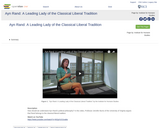
How should we understand Ayn Rand’s political philosophy? In this video, Professor Jennifer Burns of the University of Virginia argues that Rand belongs to the classical liberal tradition.

The primary goal of these resources and programming, created as part of a larger initiative to expand climate justice education at MIT, is to provide support to faculty members and instructors across disciplines in integrating climate justice content and related instructional approaches into their courses.
Funded by the Alumni Class Funds Grant, the Toolkit houses a wide range of climate-justice-adaptable teaching modules, a starter guide for teaching climate justice, resources for students, and climate justice data sets that can serve as supportive tools to enhance teaching content and approaches.

Conversations with History host Harry Kreisler welcomes Professor Fawaz A. Gerges for a discussion on the origins, evolution and future direction of Islamic militancy. (56 minutes)
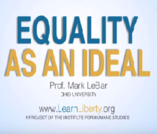
Philosophers across many different ideologies argue that equality is an important human ideal. But what type of equality should we strive for? In this lecture, Professor Mark LeBar of Florida State University reviews four different kinds of equality and the obstacles in achieving them.
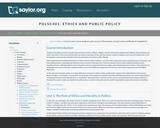
This course will provide the student with an overview of the role that ethical, cultural, religious, and moral principles play in public policy. The course will introduce the student to common themes found in the foundational theories of ethics and morality in politics such as justice, equality, fairness, individual liberty, free enterprise, charity, fundamental human rights, and minimizing harm to others. These themes are integrated into various decision-making models that you will learn about. Students will examine five types of decision frameworks used to make and implement public policy, as well as rationales used to justify inequitable impact and outcomes of policies. Upon successful completion of this course, students will be able to: explain how personal morality and ethics impact the policymaking process; discuss various ethical frameworks used to resolve policy dilemmas; identify statutes, ethical codes, and legal opinions that define the normative parameters of key domestic and international policy issues; assess the impact that public interest groups have on policymaking and execution of policies. (Political Science 401)
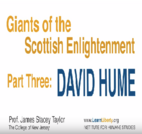
Professor James Stacey Taylor of the College of New Jersey discusses the contributions of philosopher, historian, and economist David Hume to the Scottish Enlightenment, with a particular focus on sentimentalist philosophy.
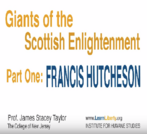
Professor James Stacey Taylor of the College of New Jersey discusses the contributions of philosopher Francis Hutcheson to the Scottish Enlightenment, especially his contributions to the sentimentalist approach to morality.
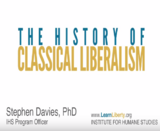
Today people often believe that classical liberalism is all about free market economics, but according to Dr. Stephen Davies of the Institute of Economic Affairs, this definition misses the mark. In this lecture, Dr. Davies explains three key insights from classical liberalism and how the ideology has influenced how we approach subjects like history, economics, and even psychology.
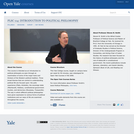
This course is intended as an introduction to political philosophy as seen through an examination of some of the major texts and thinkers of the Western political tradition. Three broad themes that are central to understanding political life are focused upon: the polis experience (Plato, Aristotle), the sovereign state (Machiavelli, Hobbes), constitutional government (Locke), and democracy (Rousseau, Tocqueville). The way in which different political philosophies have given expression to various forms of political institutions and our ways of life are examined throughout the course.
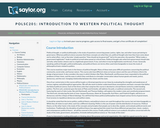
Political thought, otherwise known as political theory or philosophy, is the study of questions concerning power, justice, rights, law, and other issues pertaining to governance. This course examines major texts in the history of political thought and asks how different views on human nature inform the design of government. Upon successful completion of this course, the student will be able to: summarize the passage of political thought through the classical, Renaissance, and Enlightenment periods and based on the works of Plato, Aristotle, Machiavelli, Hobbes, Locke, Rousseau, Tocqueville, and Marx; compare and contrast the differences between Plato and Aristotle with regard to their understandings of the nature of the person, ethics, society, citizenship, and governance; explain the historical and intellectual context in which the political thought that helped to develop the modern state came to be; compare and contrast the concepts of justice, freedom, equality, citizenship, and sovereignty in the works of Machiavelli, Hobbes, Locke, and Rousseau; explain the different versions of, and importance of, 'the state of nature' to political thought; identify the influences of Hobbes, Locke, and Rousseau on the development of the United States Constitution; summarize the thoughts of Alexis de Tocqueville on the American political landscape, particularly with regard to religion and equality, and why this has importance beyond the American context; explain Karl Marx's world view, with particular regard to his critique of democracy and the modern, politically liberal, state; how it came to be; and its fundamental link to capitalism. (Political Science 201)
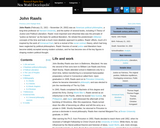
John Rawls (February 21, 1921 – November 24, 2002) was an American political philosopher, a long-time professor at Harvard University, and the author of several books, including A Theory of Justice and Political Liberalism. Rawls' most important and influential idea was the principle of "justice as fairness" as the basis for political liberalism. He refuted the predominant Utilitarian concepts of the time and took a much more idealistic approach to politics. Rawls' efforts, much of it inspired by the work of Immanuel Kant, led to a revival of the social contract theory, which had long been neglected by political philosophers. Rawls' theories of social justice and liberalism have become widely accepted among modern scholars, and he has become one of the key figures in shaping modern political thought.
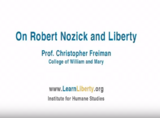
Robert Nozick was one of the most influential philosophers of the twentieth century, but according to Professor Chris Freiman of the College of William and Mary, he is frequently misunderstood. In this lecture, Professor Freiman gives an overview of Nozick’s political philosophy.
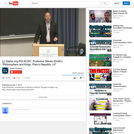
Lecture about Books I and II of Plato's Republic.
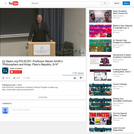
Lecture on Plato's Republic, Books III-IV.

In terms of a political entity, a state is any politically organized community living under a single system
of government. States may or may not be sovereign. For instance, federated states are members of a
federal union, and may have only partial sovereignty, but are, nonetheless, states. Some states are
subject to external sovereignty or hegemony, in which ultimate sovereignty lies in another state. States
that are sovereign are known as sovereign states.

For the last century, precepts of scientific management and administrative rationality have concentrated power in the hands of technical specialists, which in recent decades has contributed to widespread disenfranchisement and discontent among stakeholders in natural resources cases. In this seminar we examine the limitations of scientific management as a model both for governance and for gathering and using information, and describe alternative methods for informing and organizing decision-making processes. We feature cases involving large carnivores in the West (mountain lions and grizzly bears), Northeast coastal fisheries, and adaptive management of the Colorado River. There will be nightly readings and a short written assignment.

Plato's Republic, presented as a dialogue with Socrates.
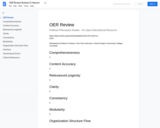
Review of Political Philosophy Reader : An Open Educational Resource: https://drive.google.com/open?id=1DERWm3kL46bnuDE3Ed-DpzoyUbr7gxIsMyFRvKoE1aI

This course uses the study of rhetoric as an opportunity to offer instruction in critical thinking. Through extensive writing and speaking assignments, students will develop their abilities to analyze texts of all kinds and to generate original and incisive ideas of their own. Critical thinking and original analysis as expressed in writing and in speech are the paramount goals of this class. The course will thus divide its efforts between an examination of the subject matter and an examination of student writing and speaking, in order to encourage in both instances the principal aims of the course.